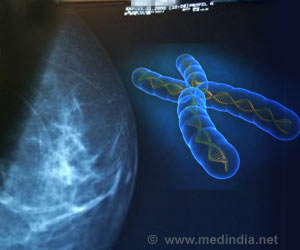Estrogen signaling was responsible for immunosuppressive effects in the tumor microenvironment across cancer types, revealed a new research.

‘Estrogen signaling was responsible for immunosuppressive effects in the tumor microenvironment across cancer types.’





"We know about estrogen's effects directly on tumor cells, but the
tumor microenvironment plays a critical role in determining malignant
progression as well as response to therapy," said José R. Conejo-Garcia,
professor in the Tumor Microenvironment and Metastasis
program at The Wistar Institute and lead author of the study. "Both
estrogen receptors are expressed on most immune cells, so we knew there
had to be a larger role that estrogen played in cancer development."Estrogen hormones bind to two high-affinity estrogen receptors (ERα and ERβ), and when a tumor is ER-positive, it could receive signals from estrogen that promote its growth and enhance its role in malignant progression. Because of this, ER-positive breast cancer is often treated with anti-estrogen therapy like tamoxifen, which has been shown to have both positive and negative effects.
While it decreases estrogen signaling in the tumor, it can increase estrogen signaling elsewhere in the body. The same therapeutic strategy has been tested in ovarian cancer, but results showed only mild effectivity with about 31% of ovarian cancers being ERα and about 60% being ERβ.
Conejo-Garcia and colleagues found that estrogen signaling is closely linked to both the accumulation and activity of myeloid-derived suppressor cells (MDSCs), a set of immune cells associated with tumors treatment resistance. Estrogen enables immunosuppression in a two-pronged approach involving MDSCs. First, the estrogen drives the mobilization of MSDCs. Then, at the same time, it makes a subset of the MDSCs more immunosuppressive in vivo.
Estrogen supplementation accelerated the growth of multiple models estrogen-insensitive tumors in immunocompetent animals, while ablating estrogen production by resecting the ovaries boosted anti-tumor immunity and delayed malignant progression. Importantly, differences in tumor progression disappeared in immunodeficient mice, demonstrating that estrogen-mediated acceleration of tumor growth depends on dampening protective anti-tumor immunity.
Advertisement
These cancer pathways are activated in a variety of inflammatory cancers in non-tumor cells, such as breast cancer, ovarian cancer, and melanoma. Since estrogen is present not just pre-menopausal women but men and post-menopausal women as well, the authors propose that investigating anti-estrogen therapeutic strategies could lead to new treatments for a variety of cancers. This strategy could halt the mobilization of MDSCs and tumor initiation.
Advertisement
Wistar's business development team is seeking a dedicated licensing partner to develop the use of anti-estrogen therapeutics in a broad range of oncology indications not traditionally associated with estrogen receptor antagonist therapy.
Source-Eurekalert















